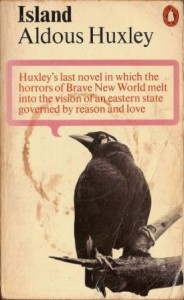
In reading ‘Island’ by Aldous Huxley I came across the paragraph below. The speaker is talking about a ‘Mutual Adoption Club’ and comparing it to Western society. On Pala (the island the title refers to) whenever the parental home becomes too unbearable the child is allowed to migrate to one of its other homes within its MAC. A MAC consists of from 15 to 25 assorted couples and everyone in the club adopts everyone else. An inclusive, voluntary family. This is one of the good ideas of the book but there are a few hoopy ones – must have been all the drugs Huxley was taking…
Things are a great deal better in your part of the world – better, but still quite bad enough. You escape the state-appointed baby-tamers; but your society condemns you to pass your childhood in an exclusive family, with only a single set of siblings and parents. They’re foisted on you by hereditary predestination. You can’t get rid of them, can’t take a holiday from them, can’t go to anyone else for a change of moral or psychological air. It’s freedom, if you like – but freedom in a telephone box.*
*Huxley, Aldous. 2005. Island. London: Vintage, p.91.

Online exhibition celebrates telephones in literature
I thought that my blog would become somewhat irrelevant over the years, as focusing on a piece of technology of the past would mainly be of interest to social historians. Yet our collected response to Covid-19 has proved me wrong. Communication is still a key feature of the make up of human beings. We all need to connect to someone. Yes, the technology has changed, but it’s still technology being put to the same use – to maintain contact.
A current online exhibition seems to prove my point. Click here for more:
https://www.theguardian.com/artanddesign/2020/nov/17/milkman-to-mark-twain-online-exhibition-celebrates-telephones-in-literature
“They can be objects of romance or harbingers of doom. They can provide plot twists, shocks, horror, comedy or character. Now the role of the telephone in literature, from the 19th century to the present day, is being celebrated in an online exhibition, Crossed Lines.
Readers of books, plays and poems were invited to send in their favourite references to telephones in literature, and almost 100 examples, from the earliest models to smartphones, were submitted from across the world…”
(from The Guardian)
Comments Off on Online exhibition celebrates telephones in literature
Posted in Comment, News
Tagged literature